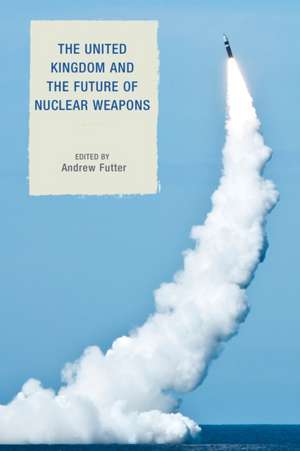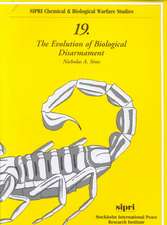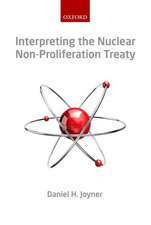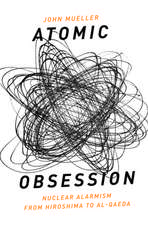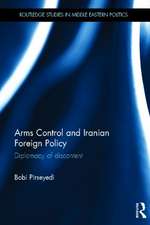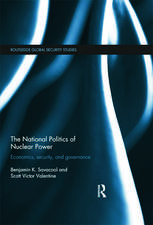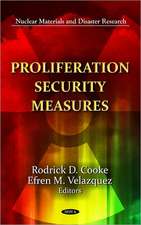The United Kingdom and the Future of Nuclear Weapons: Weapons of Mass Destruction
en Limba Engleză Hardback – 16 iun 2016
Preț: 694.00 lei
Preț vechi: 950.68 lei
-27% Nou
Puncte Express: 1041
Preț estimativ în valută:
132.80€ • 142.01$ • 110.72£
132.80€ • 142.01$ • 110.72£
Carte tipărită la comandă
Livrare economică 18 aprilie-02 mai
Preluare comenzi: 021 569.72.76
Specificații
ISBN-13: 9781442265738
ISBN-10: 1442265736
Pagini: 244
Dimensiuni: 152 x 229 x 23 mm
Greutate: 0.54 kg
Editura: Rowman & Littlefield
Seria Weapons of Mass Destruction
ISBN-10: 1442265736
Pagini: 244
Dimensiuni: 152 x 229 x 23 mm
Greutate: 0.54 kg
Editura: Rowman & Littlefield
Seria Weapons of Mass Destruction
Notă biografică
Editor:
Andrew Futter is a senior lecturer at the University of Leicester, UK
Contributors:
Peter Burt, director of the UK Nuclear Information Service
Catherine Eschle, senior lecturer, University of Strathclyde
Toby Fenwick, research associate at the Centre Forum and former RAF officer
Jonathan Hogg, senior lecturer, University of Liverpool
David Jarvis, associate fellow at the Royal United Services Institute, founder of the UK Project on Nuclear Issues, and former UK Liaison Officer at US STRATCOM
Lukasz Kulesa, research director of the European Leadership Network and former head of the Non-proliferation and Arms Control Project at the Polish Institute of International Affairs
Nick Ritchie, senior lecturer, University of York
Daniel Salisbury, research associate at the Centre for Science and Security Studies, King¿s College London
Shatabhisha Shetty, deputy director of the and co-founder of the European Leadership Network
Kristan Stoddart, senior lecturer at Aberystwyth University
William Walker, emeritus professor at the University of St Andrews
Heather Williams, MacArthur Postdoctoral Fellow at King¿s College London and former Nuclear Policy analyst at Chatham House
Henrietta Wilson, independent analyst and associate at the UK Nuclear Information Service
Cuprins
Foreword by Sir Lawrence Freedman
Introduction: the Trident debate renewed ¿ Andrew Futter
Part I ¿ British nuclear strategy: history and culture
1. 70 years of British nuclear debates: a brief history ¿ Daniel Salisbury
2. The UK nuclear deterrent: a system of systems ¿ David Jarvis
3. UK Trident renewal: antecedents and decision-making ¿ Kristan Stoddart
4. The silence of British nuclear culture ¿ Jon Hogg
Part II ¿ Trident renewal: the wider context
5. The heterogeneity of UK military views on nuclear weapons ¿ Henrietta Wilson
6. The Trident renewal decision, the UK and the NPT ¿ Shatabhisha Shetty & Lukasz Kulesa
7. The legality and legitimacy of Trident renewal ¿ William Walker
8. Trident and the special relationship ¿ Heather Williams
9. Dangerous and inhumane: the implications for UK nuclear policy of international strategies to apply humanitarian law and prohibit nuclear weapons - Rebecca Johnson
10. Bairns not bombs: the Scottish anti-nuclear movement and the British nuclear state ¿ Catherine Eschle
Part III ¿ Next steps, politics and future challenges
11. Sustaining Trident: nuclear absolutism and nuclear symbolism ¿ Nick Ritchie
12. Next steps in the UK's nuclear warhead programme: what future for the Atomic Weapons Establishment? ¿ Peter Burt
13. The future of political opposition to Trident ¿ Toby Fenwick
14. Future challenges for UK nuclear deterrence ¿ Andrew Futter
Descriere
This volume provides a study of the current UK nuclear program and related issues that reflect the complexity of the Trident weapons system and the changing nature of deterrence. Presenting the political, cultural, technical, and strategic aspects of Trident it provides a thoughtful overview of the UK's complex relationship with nuclear weapons.
